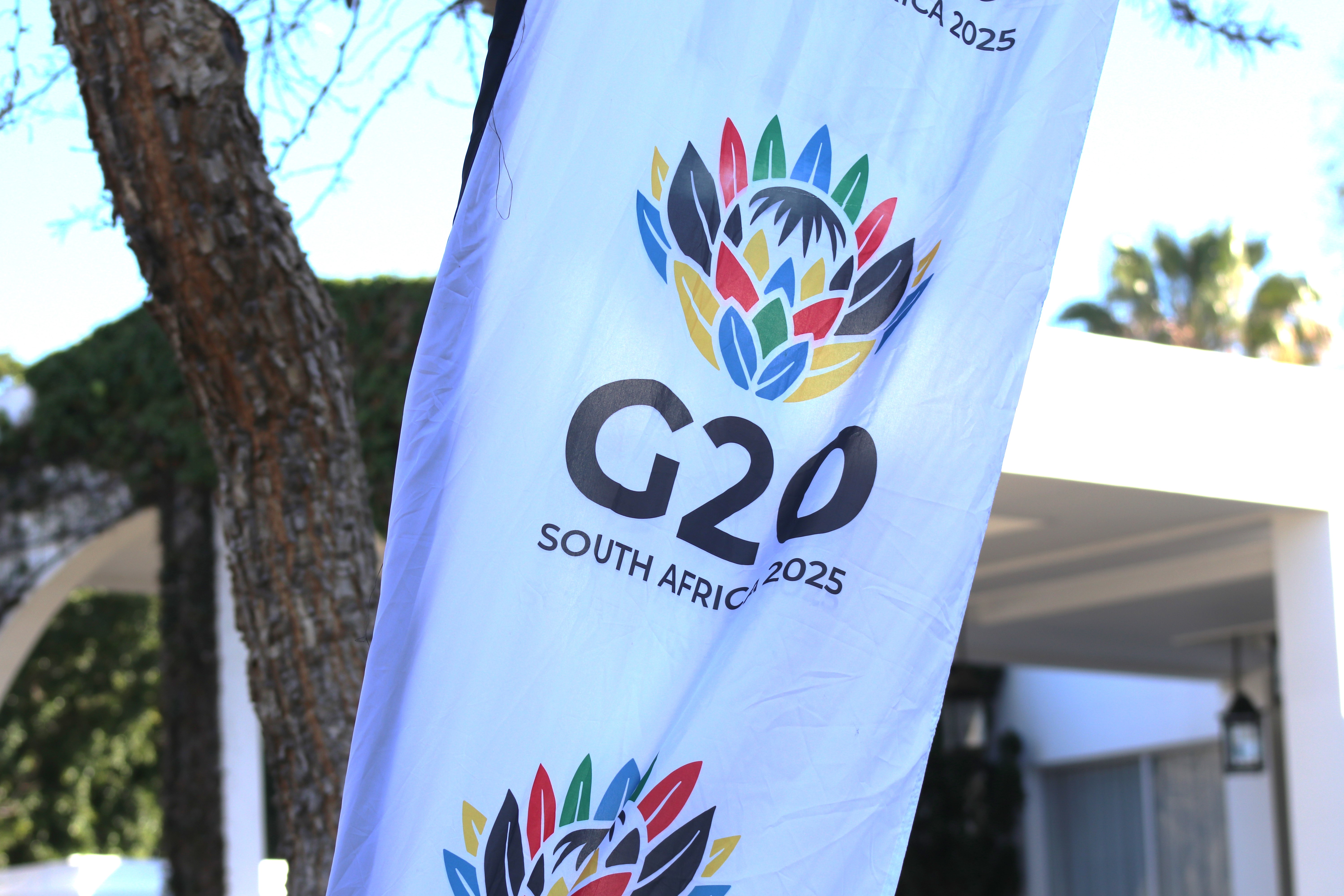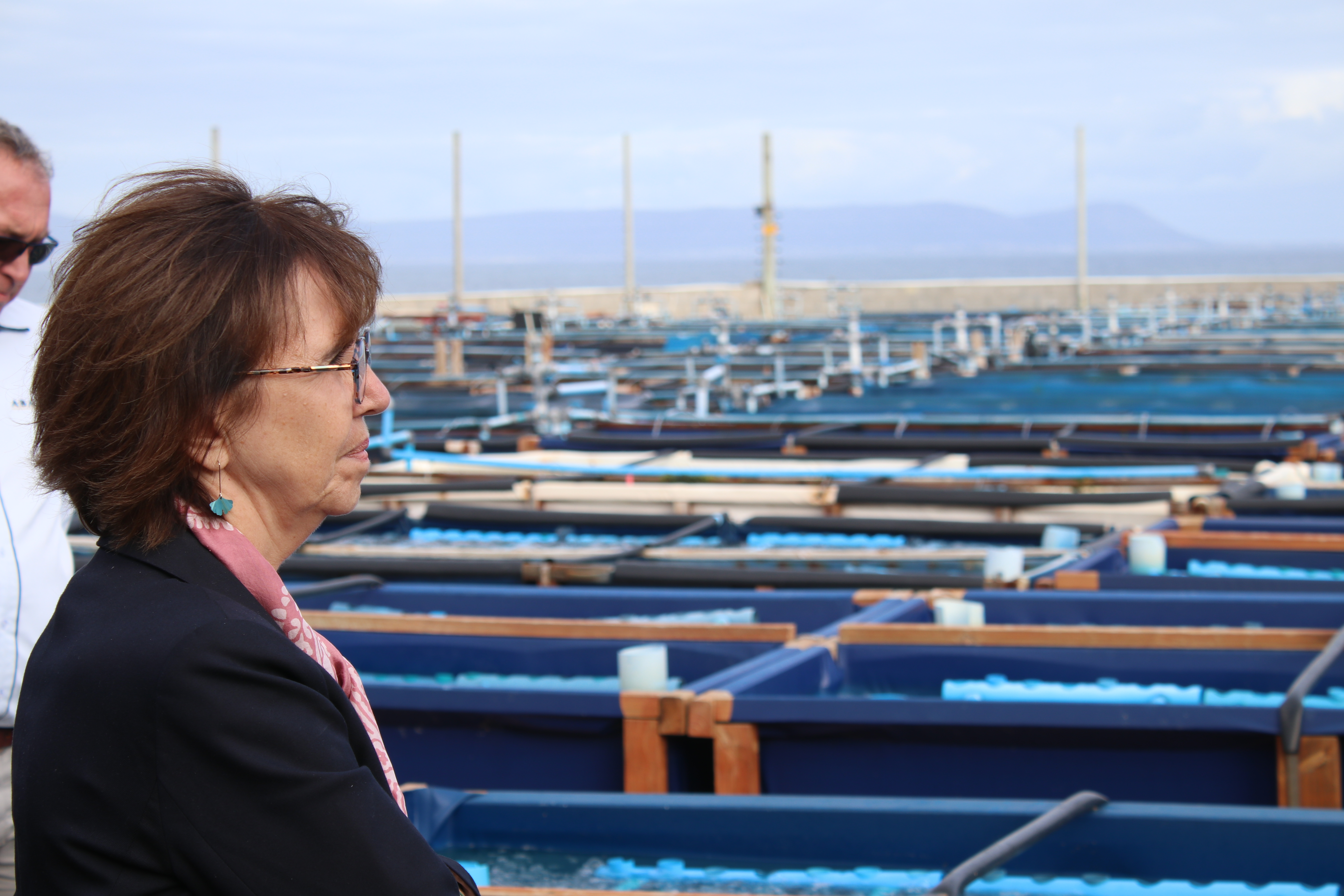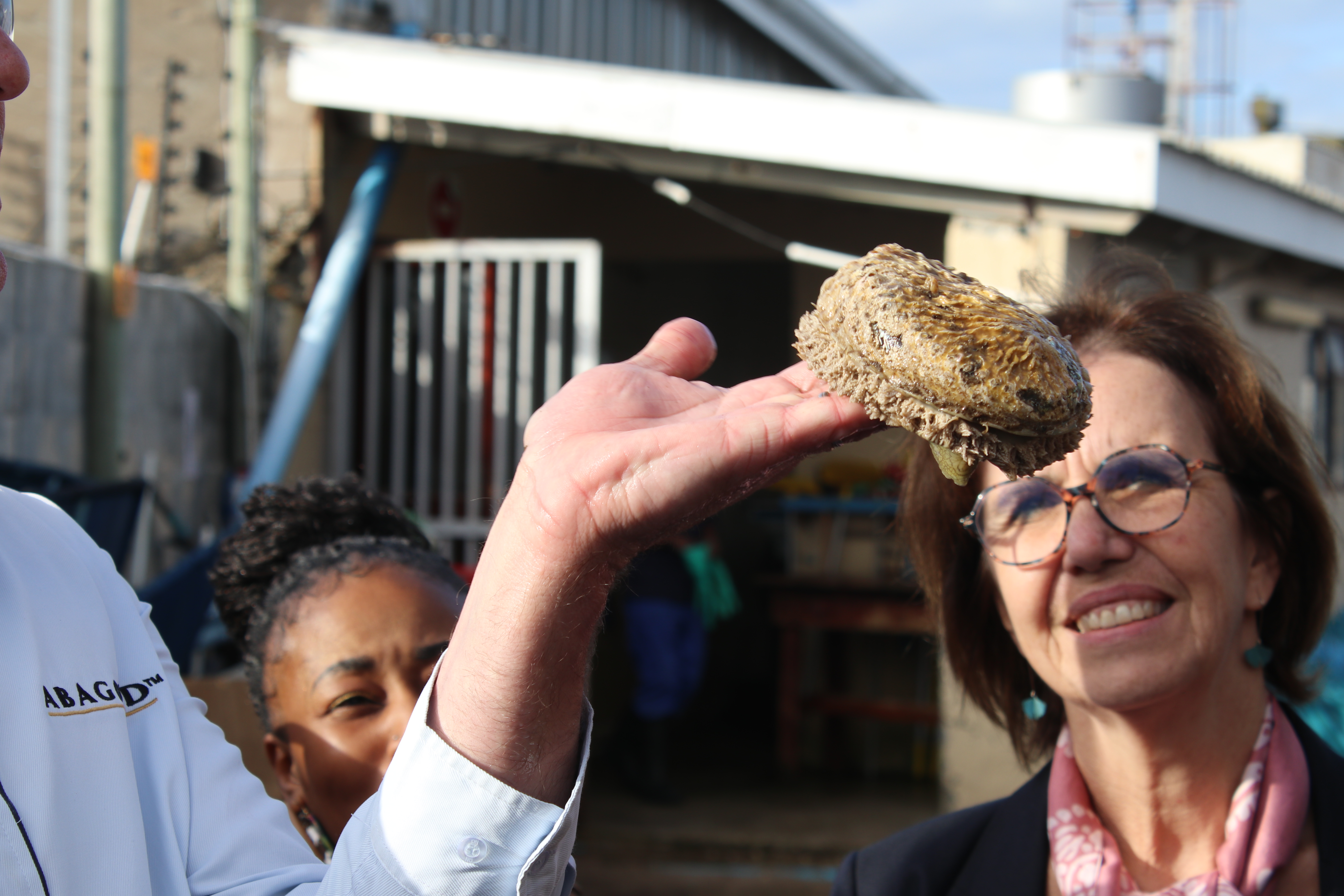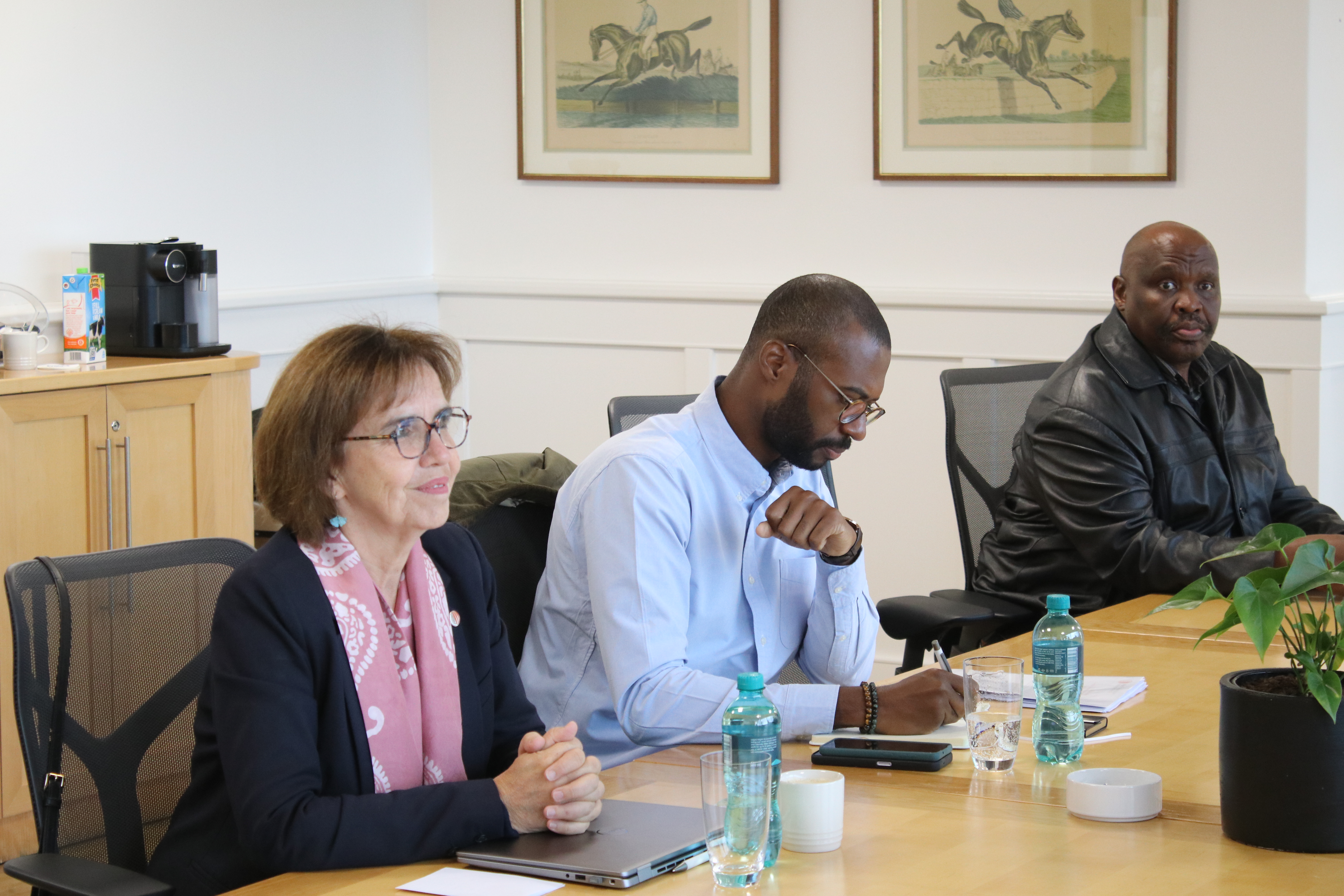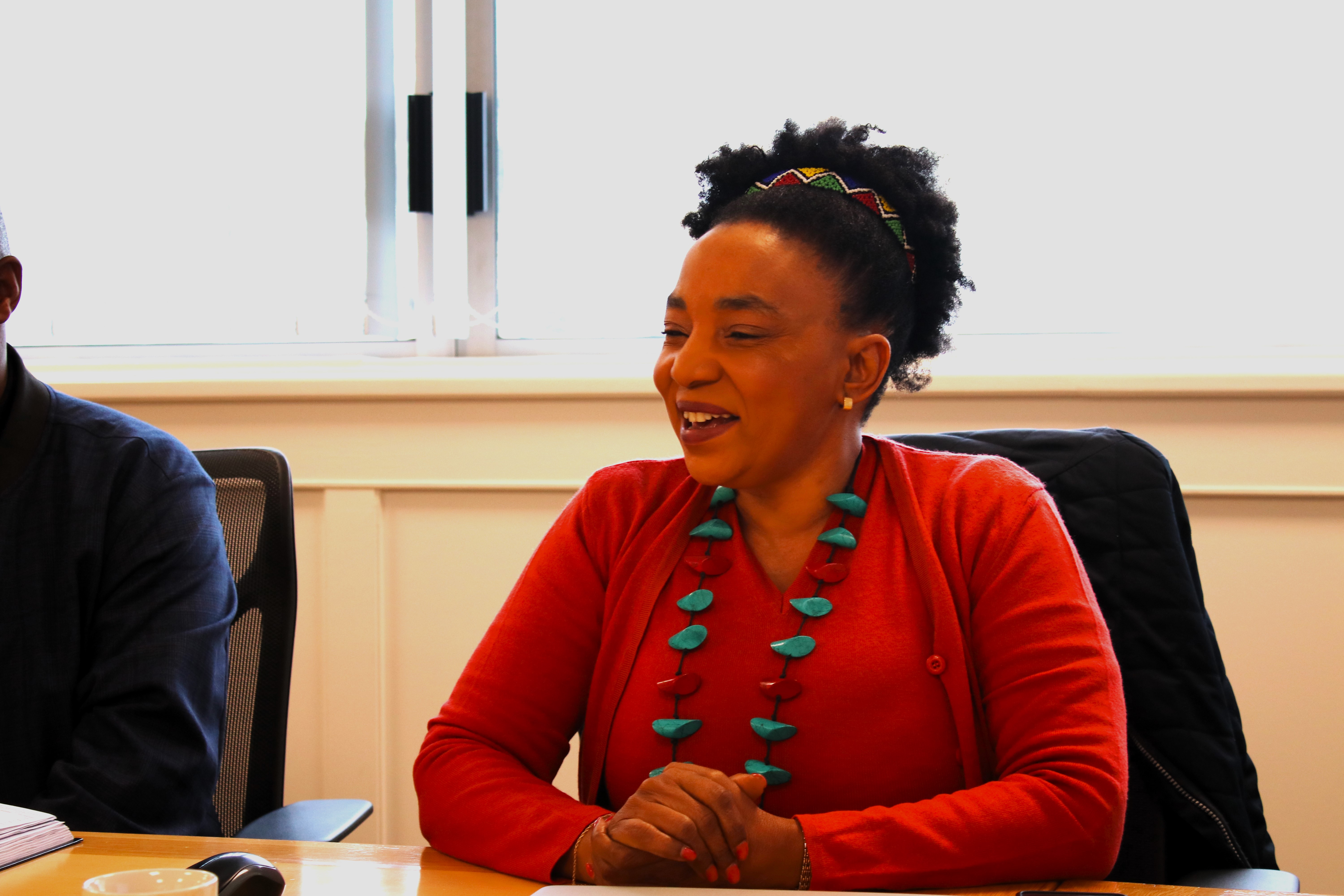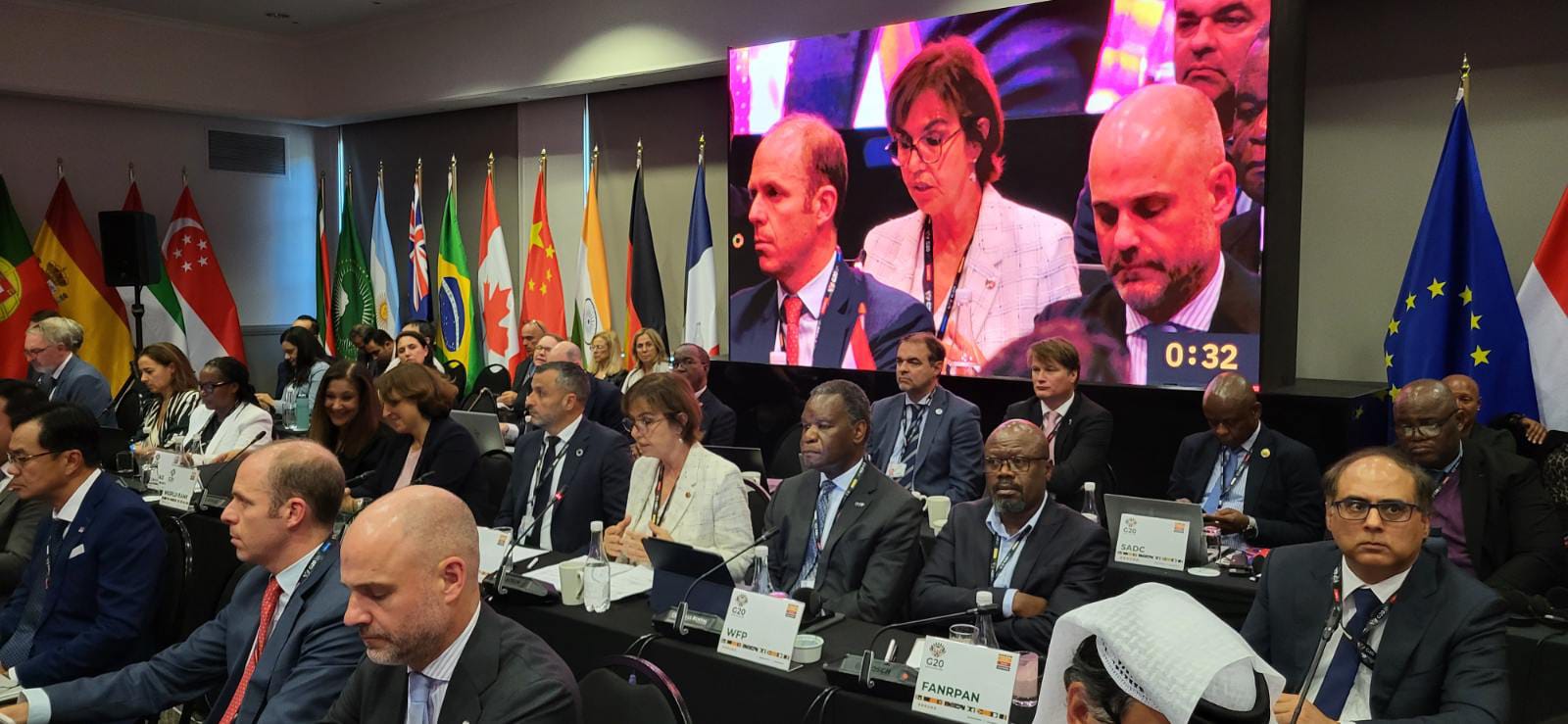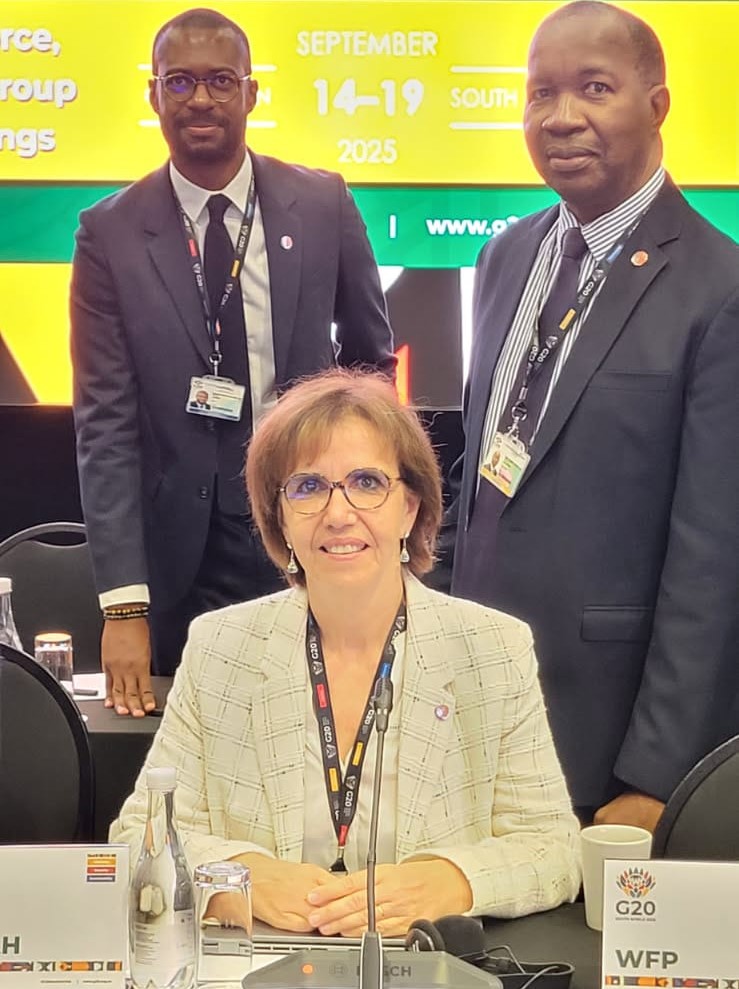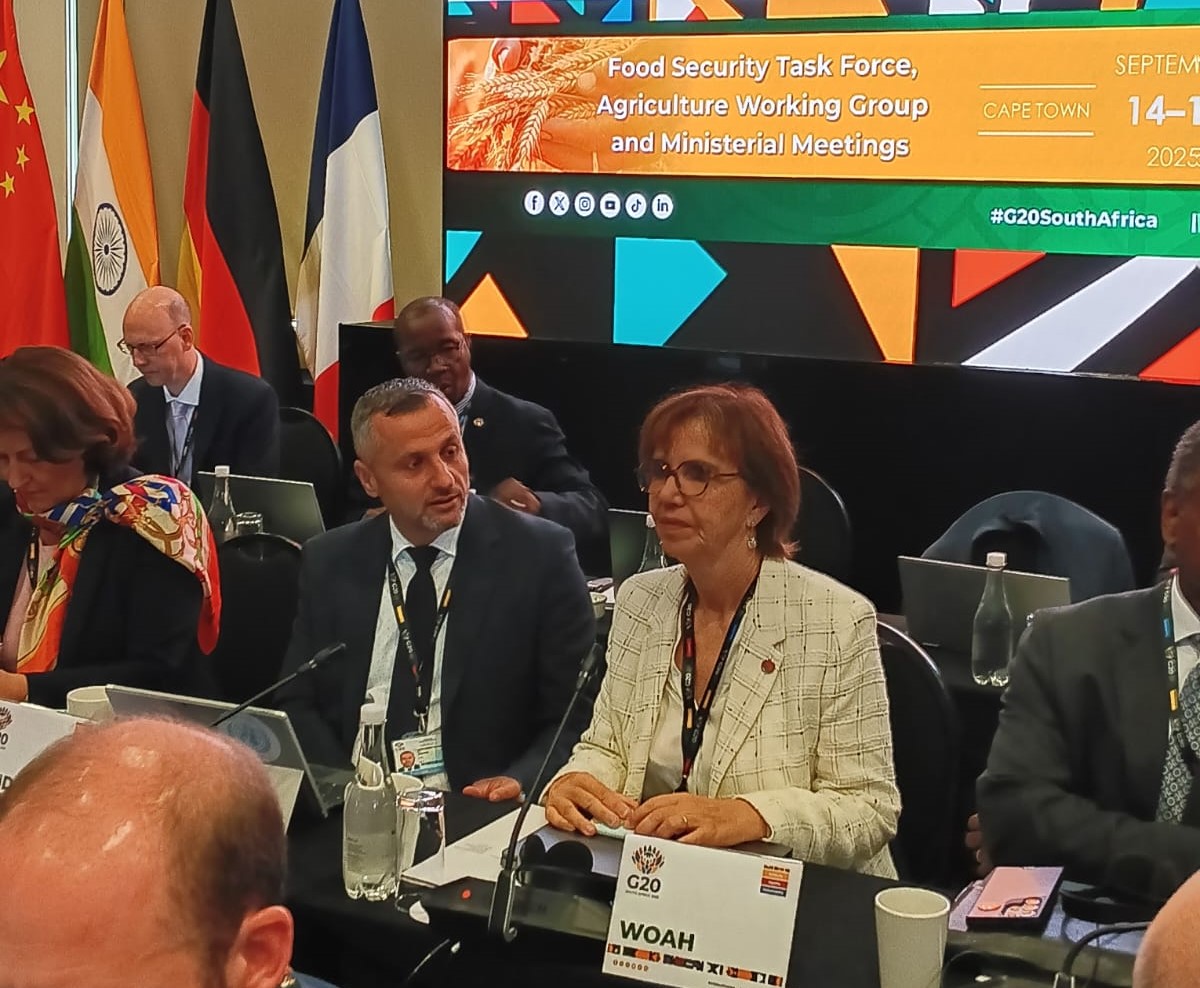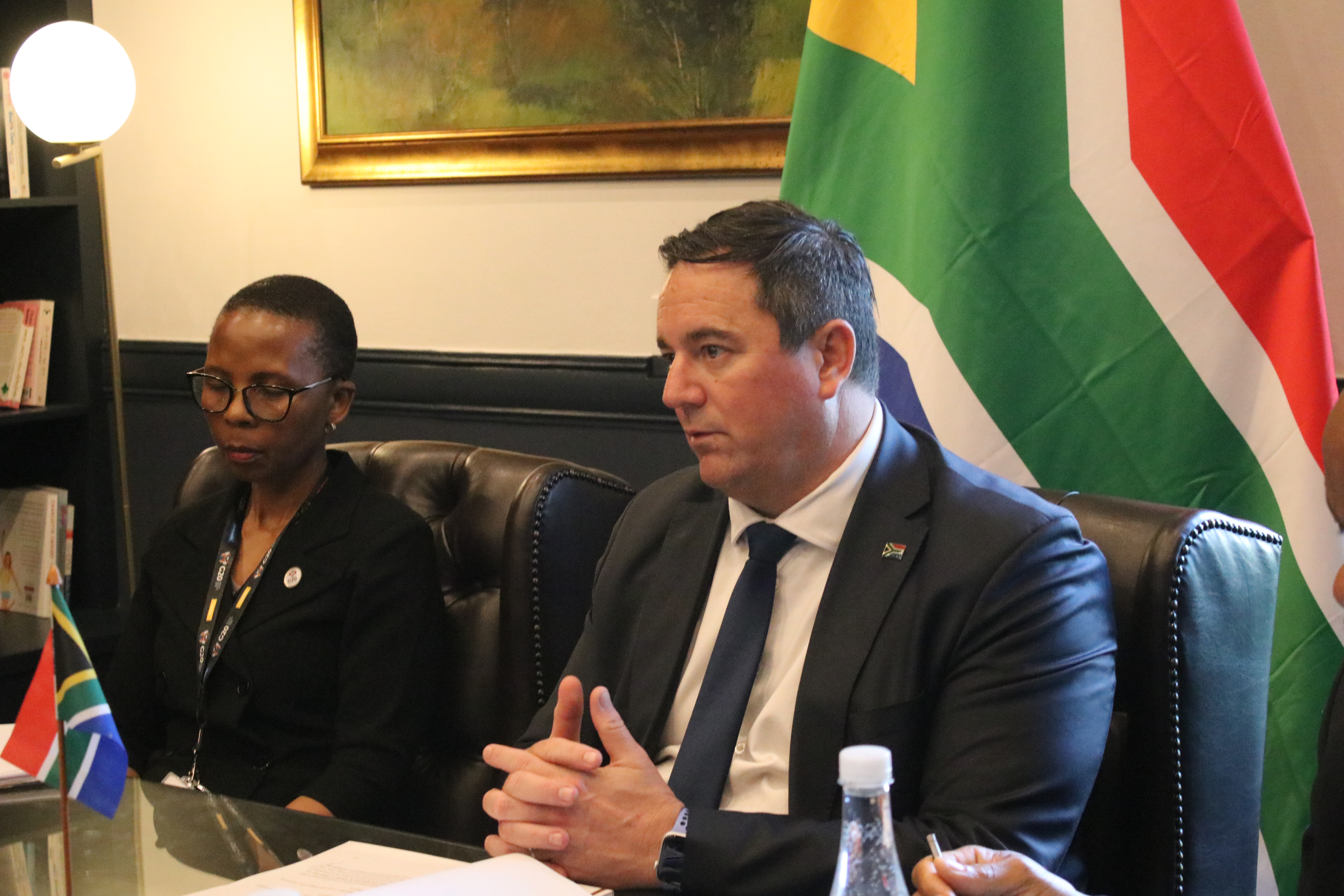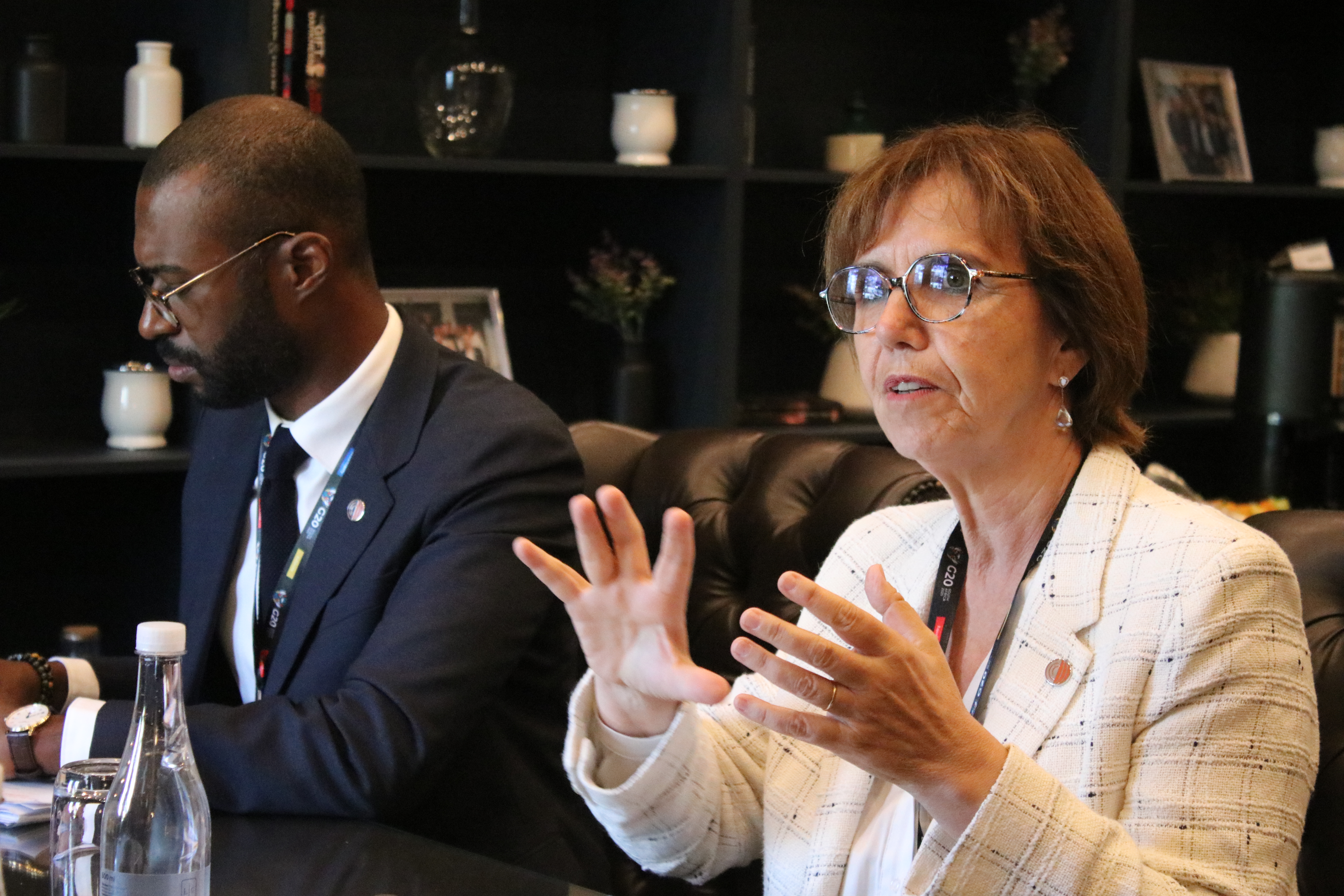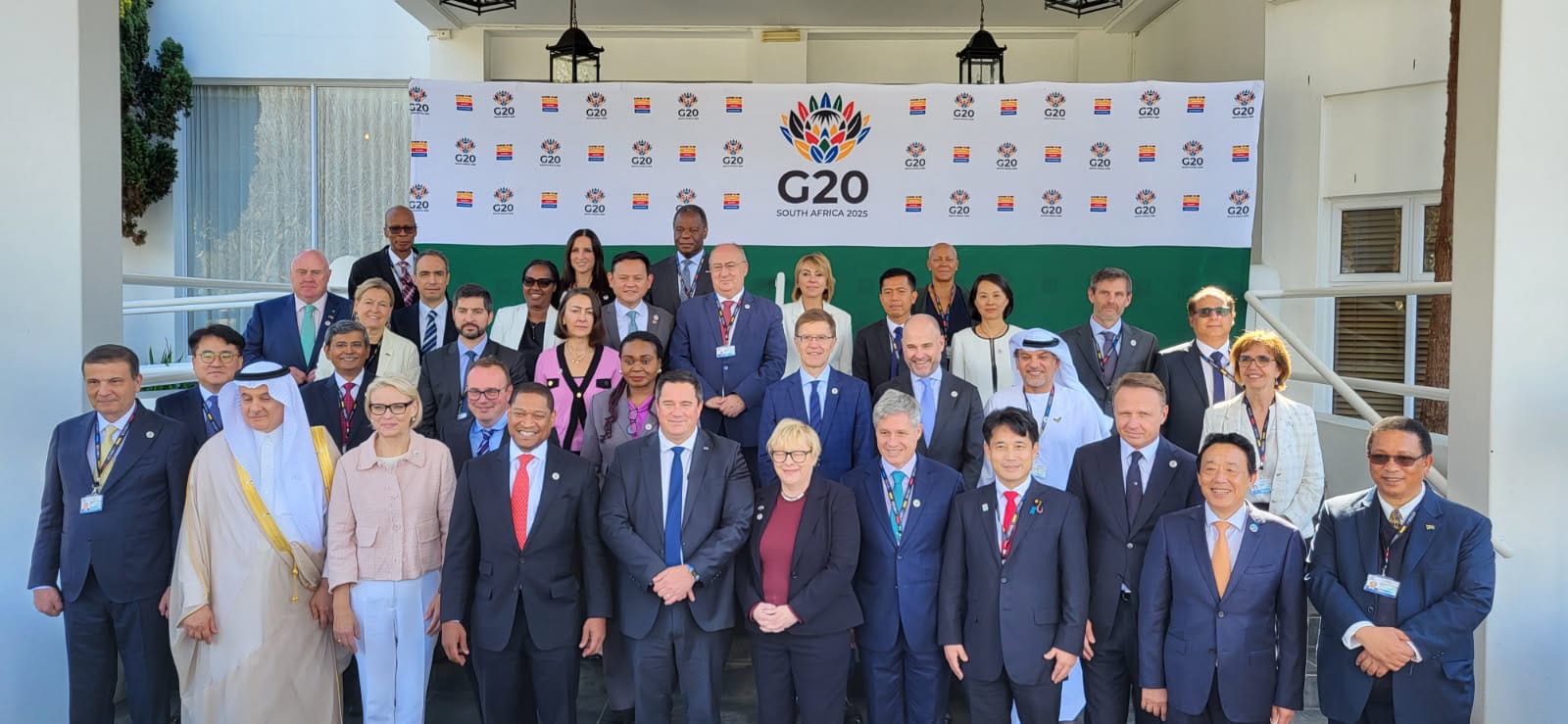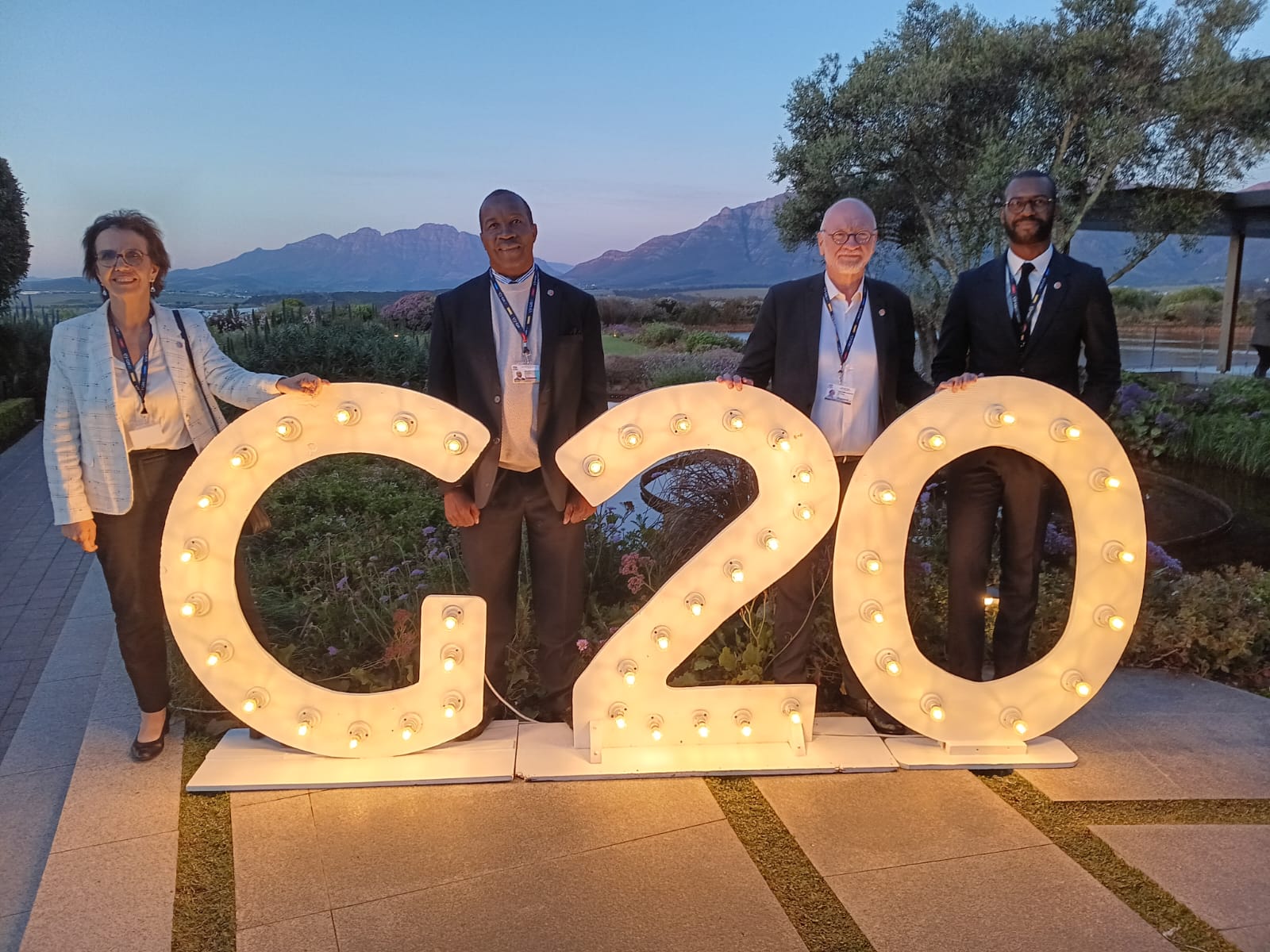
Dr Emmanuelle Soubeyran during the visit of an abalone farm in Hermanus, Western Cape, overlooking the Atlantic Ocean. Picture (c) P. Bastiaensen (woah) 2025.
Dr Emmanuelle Soubeyran during the visit of an abalone farm in Hermanus, Western Cape, overlooking the Atlantic Ocean. Picture (c) P. Bastiaensen (woah) 2025.
On 17 September 2025, ahead of the G20 Agricultural Ministerial Meeting in Cape Town, Dr Soubeyran had the opportunity to see first-hand two very different, yet equally important dimensions of animal health in South Africa.
In Hermanus, some 70 kms east of Cape Town, she visited an abalone farm — part of a growing aquaculture sector that holds great promise for economic opportunity and sustainable use of marine resources.
Admiring a full-grown farmed abalone male at the ABAGOLD farm in Hermanus, Western Cape. Picture (c) P. Bastiaensen (woah) 2025.
Admiring a full-grown farmed abalone male at the ABAGOLD farm in Hermanus, Western Cape. Picture (c) P. Bastiaensen (woah) 2025.
Countries like South Africa are showing how innovation and investment can help unlock the potential of the “blue economy.” Abalone are sea snails in the genus Haliotis and are sensitive to several (3) WOAH listed aquatic diseases : Abalone herpes virus, Perkinsus spp. and Xenohaliotis californiensis. Farmed abalone is not only a delicacy with global demand, but also a symbol of how we can relieve pressure on overexploited wild populations and combat poaching through responsible aquaculture.
In the boardroom of the Kenilworth equestrian facilities in Cape Town. Left to right : Dr Emmanuelle Soubeyran and Mr. Pierre - Emmanuel Cangah (WOAH) and Dr. Gininda Msiza, Chief Director Veterinary Services, Western Cape province. Picture (c) P. Bastiaensen (woah) 2025.
In the boardroom of the Kenilworth equestrian facilities in Cape Town. Left to right : Dr Emmanuelle Soubeyran and Mr. Pierre – Emmanuel Cangah (WOAH), as well as Dr. Gininda Msiza, Chief Director Veterinary Services, Western Cape province. Picture (c) P. Bastiaensen (woah) 2025.
Closer to Cape Town, the WOAH delegation visited the African Horse Sickness (AHS) quarantine zone at the race course in Kenilworth, a critical example of disease prevention and international cooperation. This zone, already recognised by the European Union, enables the safe movement of competition horses thanks to strict biosecurity and surveillance inside and around the disease-free zone.
Dr Mpho Maja, Director Animal Health at the South African Department of Agriculture, Land Reform and Rural Development (DALRRD). Picture (c) P. Bastiaensen (woah) 2025.
Dr Emmanuelle Soubeyran during her address to the G-20 Ministers. Picture (c) Pierre Emmanuel Cangah (woah) 2025
Dr Emmanuelle Soubeyran during her address to the G-20 Ministers. Picture (c) P. E. Cangah (woah) 2025
On Thursday 18 September, Dr Emmanuelle Soubeyran attended the Ministerial Meeting of the group of G-20 countries, chaired and hosted by the Republic of South Africa. The G20, or Group of Twenty is a forum for international economic cooperation involving 19 countries and two regional organizations, the European Union (EU) and the African Union (AU). It brings together leaders from the world’s major economies to address global economic issues and foster collaboration. The G20 represents a significant portion of the world’s economy, encompassing approximately 80% of global GDP, 75% of international trade, and two-thirds of the world’s population.
Dr Emmanuelle Soubeyran during the G-20 Ministers' meeting. Standing behind her (left) are Mr. Pierre-Emmanuel Cangah, WOAH Chief of Staff and (right) Dr. Moetapele Letshewenyo, WOAH Sub-Regional Representative for Southern Africa. Picture (c) P. Bastiaensen (woah) 2025
Dr Emmanuelle Soubeyran during the G-20 Ministers’ meeting. Standing behind her (left) are Mr. Pierre-Emmanuel Cangah, WOAH Chief of Staff and (right) Dr. Moetapele Letshwenyo, WOAH Sub-Regional Representative for Southern Africa. Picture (c) P. Bastiaensen (woah) 2025.
The G20 aims to coordinate macroeconomic policies, address global financial crises, and promote sustainable development. The 19 countries are Argentina, Australia, Brazil, Canada, China, France, Germany, India, Indonesia, Italy, Japan, Mexico, Russia, Saudi Arabia, South Africa (current chair and host), South Korea, Turkey, the United Kingdom, and the United States. Several observer countries were also in attendance : The Netherlands, Singapore,… These same countries are all also WOAH Members.
In her address, the WOAH Director General called on the G20 to integrate animal health into climate, food security, and health strategies, to invest in veterinary services as the frontline of prevention, and to transform the OneHealth approach from concept into action:
“Animal health is not simply a veterinary concern. It is a political, economic, and social imperative. It is central to the resilience of food systems, the health of ecosystems, the stability of rural economies, and the security of global public health. If we neglect animal health today, we risk paying a far higher price tomorrow in economic loss, food insecurity, zoonotic pandemics, and environmental degradation”, she added.
Dr Emmanuelle Soubeyran during her address to the G-20 Ministers. Picture (c) Pierre Emmanuel Cangah (woah) 2025
Dr Emmanuelle Soubeyran, WOAH Director General
The final declaration which was adopted at this Summit reads, amongst others, that the G-20 Ministers of Agriculture:
The Minister of Agriculture, Land Reform and Rural Development (DALRRD), the Hon. Mr. John Steenhuisen. Picture (c) P. Bastiaensen (woah) 2025.
Dr Emmanuelle Soubeyran (right) during the bilateral meeting with the Minister of Agriculture, Land Reform and Rural Development (DALRRD), the Hon. Mr. John Steenhuisen. On the left is Mr. Pierre-Emmanuel Cangah, WOAH Chief of Staff. Picture (c) P. Bastiaensen (woah) 2025.
Dr Emmanuelle Soubeyran (right) during the bilateral meeting with the Minister of Agriculture, Land Reform and Rural Development (DALRRD), the Hon. Mr. John Steenhuisen. On the left is Mr. Pierre-Emmanuel Cangah, WOAH Chief of Staff. Picture (c) P. Bastiaensen (woah) 2025.
On the sidelines of the G-20 conference, the Director General met with the host, Hon. Mr. John Steenhuisen, Minister of Agriculture, Land Reform and Rural Development of South Africa and his Directors. The discussions focused on strengthening cooperation to protect animal health in the Republic of South Africa and beyond. They exchanged views on strategies to control Foot and mouth disease (FMD), drawing inspiration from successful experiences in other regions, and considered how regional collaboration could amplify impact.
South Africa plays a leading role within WOAH through its scientific, technical and institutional contributions, from hosting two WOAH Collaborating Centres and several Reference Laboratories at the Onderstepoort Veterinary Research Institute and the University of Pretoria, to supporting regional initiatives such as the Aquatic Animal Health Laboratory Network and broader One Health programmes. These capacities are an asset not only for the country, but also for the larger One Health global community.
